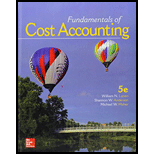
Fundamentals of Cost Accounting
5th Edition
ISBN: 9781259565403
Author: William N. Lanen Professor, Shannon Anderson Associate Professor, Michael W Maher
Publisher: McGraw-Hill Education
expand_more
expand_more
format_list_bulleted
Question
Chapter 11, Problem 46E
a.
To determine
Assuming that Company K continues to use the physical quantities method of allocation, calculate the joint costs will be allocated to KA and KB, respectively.
b.
To determine
Recommend Company K a product to sell at split-off point.
Expert Solution & Answer
Want to see the full answer?
Check out a sample textbook solution
Students have asked these similar questions
Given the following costs and activities for Alpha
Manufacturing, use the high-low method to calculate Alpha's
variable electrical costs per machine hour.
• March: Cost = $9,800, Machine Hours = 12,500
.
=
April: Cost $11,200, Machine Hours = 15,400
=
May: Cost $10,500, Machine Hours = 13,900
A 120-day, 10% note for $12,000, dated July 1, is received from
a customer on account. What is the maturity value of the
note?
a. $12,400
b. $12,333
c. $12,000
d. $12,500
General accounting
Chapter 11 Solutions
Fundamentals of Cost Accounting
Ch. 11 - Why do companies allocate costs? What are some of...Ch. 11 - What are the three methods of allocating service...Ch. 11 - What are the similarities and differences among...Ch. 11 - What criterion should be used to determine the...Ch. 11 - What is a limitation of the direct method of...Ch. 11 - What is a limitation of the step method of...Ch. 11 - Prob. 7RQCh. 11 - Why would a number of accountants express a...Ch. 11 - Prob. 9RQCh. 11 - What is the basic difference between the...
Ch. 11 - Prob. 11RQCh. 11 - If cost allocations arc arbitrary and potentially...Ch. 11 - Prob. 13CADQCh. 11 - Prob. 14CADQCh. 11 - Prob. 15CADQCh. 11 - Prob. 16CADQCh. 11 - Prob. 17CADQCh. 11 - Prob. 18CADQCh. 11 - What are some of the factors that a company needs...Ch. 11 - Prob. 20CADQCh. 11 - Prob. 21CADQCh. 11 - How is joint cost allocation like service...Ch. 11 - Prob. 23CADQCh. 11 - In what ways is joint cost allocation similar to...Ch. 11 - Why Are Costs Allocated?Ethical Issues You are the...Ch. 11 - Cost Allocation: Direct Method Caro Manufacturing...Ch. 11 - Prob. 27ECh. 11 - Cost Allwat ion: Direct Method University Printers...Ch. 11 - Cost Allocation: Step Method Refer to the data for...Ch. 11 - Prob. 30ECh. 11 - Cost Allocation: Reciprocal Method Refer to the...Ch. 11 - Cost Allocation: Reciprocal Method, Two Service...Ch. 11 - Prob. 33ECh. 11 - Prob. 34ECh. 11 - Prob. 35ECh. 11 - Prob. 36ECh. 11 - Net Realizable Value Method Euclid Corporation...Ch. 11 - Estimated Net Realizable Value Method Blasto,...Ch. 11 - Net Realizable Value Method to Solve for Unknowns...Ch. 11 - Net Realizable Value Method Bixel Components...Ch. 11 - Net Realizable Value Method with By-Products...Ch. 11 - Net Realizable Value Method Deming Sons...Ch. 11 - Physical Quantities Method Refer to the facts in...Ch. 11 - Prob. 44ECh. 11 - Physical Quantities Method The following questions...Ch. 11 - Prob. 46ECh. 11 - Physical Quantities Method with By-Product...Ch. 11 - Step Method with Three Service Departments Model,...Ch. 11 - Comparison of Allocation Methods BluStar Company...Ch. 11 - Solve for Unknowns: Direct Method Franks Foods has...Ch. 11 - Solve for Unknowns: Step Method RT Renovations is...Ch. 11 - Cost Allocation: Step Method with Analysis and...Ch. 11 - Prob. 53PCh. 11 - Prob. 54PCh. 11 - Cost Allocation: Step and Reciprocal Methods...Ch. 11 - Allocate Service Department Costs: Direct and Step...Ch. 11 - Prob. 57PCh. 11 - Reciprocal Cost AllocationOutsourcing a Service...Ch. 11 - Prob. 59PCh. 11 - Reciprocal Cost AllocationOutsourcing a Service...Ch. 11 - Prob. 61PCh. 11 - Fletcher Fabrication, Inc., produces three...Ch. 11 - Findina Missing Data: Net Realizable Value Spartan...Ch. 11 - Finding Missing Data: Net Realizable Value Blaine,...Ch. 11 - Joint Costing in a Process Costing Context:...Ch. 11 - Find Maximum Input Price: Estimated Net Realizable...Ch. 11 - Effect of By-Product versus Joint Cost Accounting...Ch. 11 - Prob. 68P
Knowledge Booster
Learn more about
Need a deep-dive on the concept behind this application? Look no further. Learn more about this topic, accounting and related others by exploring similar questions and additional content below.Similar questions
- What was the amount of sales for the montharrow_forwardWant Solutionarrow_forwardArcher Corp. planned and actually manufactured 250,000 units of its single product in 2015, its first year of operations. Variable manufacturing costs were $28 per unit of product. Planned and actual fixed manufacturing costs were $750,000, and marketing and administrative costs totaled $500,000 in 2015. Archer sold 150,000 units of product in 2015 at a selling price of $38 per unit. What is Archer's 2015 operating income using variable costing?arrow_forward
- What was the amount of swift corporationarrow_forwardUsing these data write everglow bakeries accounting equation of this accounting questionarrow_forwardGeneral Accounting: Zmeta Glass Studio uses batch costing: Raw materials: Base cost $150/batch, each worker produces 3 batches per shift, every batch consumes electricity worth 15% of raw materials. If 4 workers complete full shifts, determine total production cost.arrow_forward
arrow_back_ios
SEE MORE QUESTIONS
arrow_forward_ios
Recommended textbooks for you
- Principles of Accounting Volume 2AccountingISBN:9781947172609Author:OpenStaxPublisher:OpenStax College
 Survey of Accounting (Accounting I)AccountingISBN:9781305961883Author:Carl WarrenPublisher:Cengage Learning
Survey of Accounting (Accounting I)AccountingISBN:9781305961883Author:Carl WarrenPublisher:Cengage Learning

Principles of Accounting Volume 2
Accounting
ISBN:9781947172609
Author:OpenStax
Publisher:OpenStax College

Survey of Accounting (Accounting I)
Accounting
ISBN:9781305961883
Author:Carl Warren
Publisher:Cengage Learning
Incremental Analysis - Sell or Process Further; Author: Melissa Shirah;https://www.youtube.com/watch?v=7D6QnBt5KPk;License: Standard Youtube License